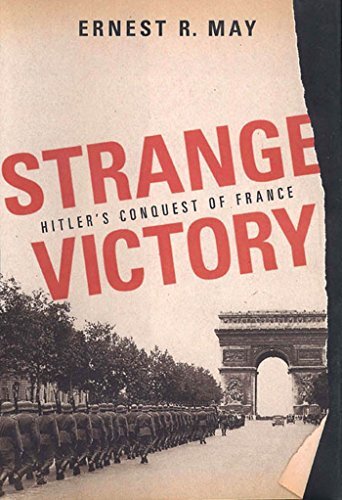Balancing a cabinet on the edge of disaster: France 1940
I recently read Strange Victory: Hitler's Conquest of France, by Ernest R. May, about the Fall of France in 1940. May has written a number of books about executive decision making in foreign policy and intelligence assessment. Strange Victory is very much about that. May gives you an excellent view of the constraints facing the various participants, the constraints they thought they faced and maybe didn't, and how events can seem to go with glacial slowness, only to suddenly accelerate without warning.
On September 1, 1939 France and Britain, having promised to do so without anticipating that they would really have to follow through (the point was to dissuade Hitler from going ahead, they didn't really expect to have to do it), declared war on Germany in response to its invasion of Poland.
But then they didn't really do very much. There is some reason for this, there were a number of difficulties, but they both futzed around from then until May 10, 1940, blaming each other for things, when Hitler decided put an end to their prevarication.
So it's interesting to contemplate some of the problems facing Edouard Daladier, France's prime minister, after the declaration of war:
The autumn of 1939 had been frustrating for Daladier. He had tried to form a national government, hoping that in wartime he would not have to continue formulating every act or decree like a pharmacist preparing a complicated prescription. With the goal of at least having his own Radical Socialist Party [despite the name, a centrist party] united behind him, he asked Herriot, his old mentor and rival, to replace Bonnet as foreign minister. But Herriot said he would serve only if the cabinet also included Marshal Pétain, and Pétain refused to serve with Herriot on the ground that Herriot's appointment as foreign minister would alienate Mussolini and Franco. Socialist leaders also refused to serve either with one another or without one another. Paul Faure, himself ineligible because a pacifist and unregenerately munichois [as appeasers were known after the Munich agreement of 1938], swore to oppose a cabinet that contained Léon Blum or any socialist on Blum's side. He reportedly said that, if Blume entered the government, "then all Israel with him! That would be war without end!" [no surprise, Faure ended up serving Vichy, Blum in Buchenwald]. Faure and Blum alike threatened to vote against a cabinet that included anyone from the right; Flandin and others linked to employers' groups vetoed inclusion of even a moderate trade-union leader.
Soon after, Daladier yielded the premiership to Paul Reynaud—but Reynaud had to retain almost all of Daladier's cabinet, including Daladier as both minister of defense and minister of war. That's cabinet politics in the twilight of the Third Republic.
The closer you look at history, the less clear its lessons seem to be, and the more complex and tangled the lines of causation. May sees France's (and Britain's) failure as largely down to poor acquisition and management of intelligence. I'll try to take a look at that in a bit.
